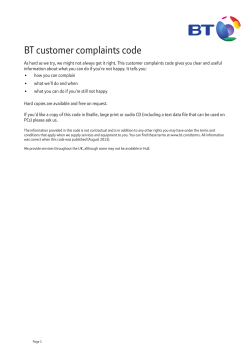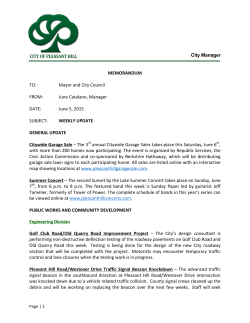
How to avoid a call to the CMPA Sarah McClennan, MHSc, MD FRCPC
How to avoid a call to the CMPA Sarah McClennan, MHSc, MD FRCPC October 21, 2011 In Fact: ● How to avoid a complaint …. ● Call CMPA ○ Risk Identification ○ Risk Assessment ○ Risk Management Disclosures FINANCIAL DISCLOSURE: Honorarium: McMaster University PERSONAL DISCLOSURE: I’ve had a complaint Objectives 1. Describe the three most important measures you can do to avoid medicallegal action. 2. Explain the high risk circumstances that should make your radar go up in a busy ED. 3. List high risk diagnoses that are the most common cause of complaint Resolution of 11,222 US ED closed claims 1985-2007 Determining Negligence 1. Duty of Care 2. Breach of Duty 3. Causation 4. Harm DUTY OF CARE In the context of a busy ED …. 1. You are shown an ECG of patient in WR? 2. There are 35 people WTBS? 3. Medical Directives have been sent, but patient still waiting, or then leaves? 4. Patient has been seen, but LABS? BREACH OF DUTY 1. Failure of Diagnosis 37% 2. Improper Performance 17% 3. Delays in Care 7% ACADEMIC EMERGENCY MEDICINE 2010; 17:553–560 Most common missed diagnoses 1. AMI 2. Appendicitis 3. Fractures ACADEMIC EMERGENCY MEDICINE 2010; 17:553–560 Case 1 DAY 1: 45 yo healthy male injured R shoulder at work. Day 2: Saw Family MD DX: Rotator Cuff Injury Day 3: Awoke 0100 with R CP and mild SOB. Called EMS. CHART ● HPI: ● O/E moaning ++++, looks a little pale, tender over R upper chest, good air entry to lung apex, vitals satisfactory. ● Imp: right shoulder and upper chest pain NYD. Next Family MD Visit ● Pt had ongoing CP/SOB ● At that point, ECG showed STEMI and decreasing trops ● Pt not eligible for PCI = complaint to CPSO Complaint ● Failed to diagnose AMI ● Harm – poor EF, CHF, dysrhythmias,ICD, couldn’t work, marital discord Outcome 1. Emerg MD failed to reconsider dx when pt did not respond to narcotics 2. The medical record did not capture the temporal course of care and the physician’s progressive diagnostic reasoning. Take home message: DOCUMENTATION DOCUMENTATION 1. Needs to demonstrate DDx 2. Temporal course = REASSESSMENTS Case 2 ● 40 yo male well known in ED for disruptive behaviour and drug seeking ● Presents intoxicated with a new H/A ● Demands to be seen ● Becomes verbally abusive when nurse attempts to take BP ● Knowing the patient, MD goes in and situation escalates whereby both parties are shouting and shaking fists Complaint ● Verbal and Physical assault ● The patient claimed the incident caused him significant embarrassment and psychological damage. Outcome 1. No evidence of physical assault; 2. Verbal assault witnessed and documented by others 3. The CMPA was unable to find any support for the physician’s actions. Medical experts stated the physician failed to take appropriate steps to calm the patient and defuse the situation. TAKE HOME MESSAGE: COMMUNICATION CPSO “Inadequate communication between MD’s and patients or patient’s families is still the underlying cause for most of the problems that the CPSO is asked to investigate” CASE 3 ● 29 yo male athlete presented to ED with 1 day hx of right flank pain, n/v/diarrhea. ● PMH: Chronic membranous GN Creatinine 1/52 was 490 CHART Clinical Course ● The patient continued to experience considerable pain ● 5 days later, he returned to ER ● Cr was now 1200 ● Perforated ulcer was suspected ● Surgery consulted ● At laparotomy, perforated appendix and subphrenic and subhepatic abscesses were found Clinical Course ● Long hospital stay ● Required dialysis ● Renal transplant 16 months later Complaint ● Following transplant, complainant commenced a lawsuit for: 1. Failure to diagnose appendicitis 2. Failure to refer to surgery 3. Failure to provide adequate discharge instructions Outcome 1. Judge thought the patient was not adequately instructed about when to return. 2. Patient was awarded compensation on behalf of the emergency physician. Informed Discharge ● Patient’s need to know: 1. When to return (temporal course) 2. Red Flags 3. Where to return Informed Discharge A physician can delegate the responsibility of informed discharge to: 1. No one 2. Nurse 3. Colleague 4. Trainee Summary Most people will get a complaint … ● Documentation ● Communication ● Informed Discharge QUESTIONS? Disclosure of Potential Conflict of Interest Evidence Based Emergency Medicine October 21, 2011 Dr. Sarah McClennan, MHSc, MD, FRCPC Avoiding a Call to the CMPA FINANCIAL DISCLOSURE Honorarium: McMaster University
© Copyright 2025





















